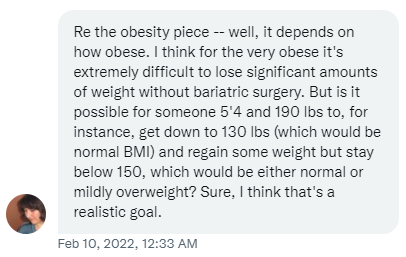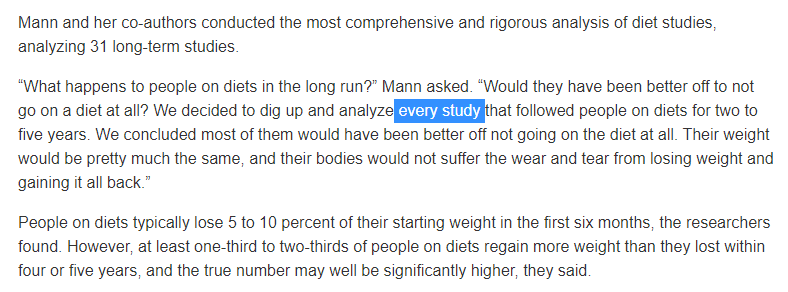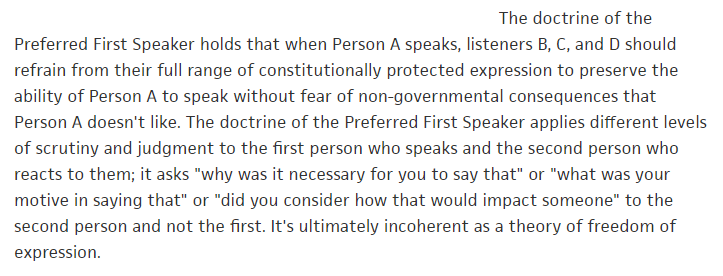
One reason the "do diets work?" debate interests me is because so many things that are terrible for fat people (and others) rests on that foundational belief that fat people could stop being fat if they wanted to.
(thread)
(thread)
.CathyYoung63 wrote "Obesity should be met with compassion, not 'acceptance.'" But if weight loss diets don't work for most fat people, then telling fat people not to accept our bodies is the opposite of being compassionate.
nydailynews.com/opinion/ny-ope…
nydailynews.com/opinion/ny-ope…
(Definitions: By "work," I mean that a typical fat person will be able to follow the plan and become sustainably non-fat.
By "weight-loss plan" or "weight-loss diet," I mean any plan for losing weight that depends on controlling what's eaten. This includes "lifestyle changes.")
By "weight-loss plan" or "weight-loss diet," I mean any plan for losing weight that depends on controlling what's eaten. This includes "lifestyle changes.")
Of course, Cathy does believe weight-loss diets work. She supports this in her NY Daily News article with two links, which I'm going to examine in this thread. Spoiler alert: Neither link supports Cathy's beliefs. 

When I read this, my first question was what "realistic goals" means (where Cathy says weight loss programs work "if they involve realistic goals").
I got in touch with Cathy, who was nice enough to give me an example of something she'd say is a "realistic goal."
I got in touch with Cathy, who was nice enough to give me an example of something she'd say is a "realistic goal."
Cathy thinks it's a realistic goal for someone at 5'4" and 190lbs to diet down to 130 and remain below 150 in the long run.
So that's losing 60lbs - almost one third of total body weight - in the short term, and >40 long term, or 21% of body weight.
So that's losing 60lbs - almost one third of total body weight - in the short term, and >40 long term, or 21% of body weight.

That's not entirely impossible. But the evidence - including the evidence Cathy cites - shows that it's an extremely unrealistic goal, and the large majority of people who try will not succeed.
Let's examine Cathy's links.
Let's examine Cathy's links.
First, Cathy says, "Diets that involve radically reducing or eliminating the consumption of certain types of food are also likely to be ineffective..."
But that's not what the article Cathy links to, or the study it's based on, says.
newsroom.ucla.edu/releases/Dieti…
But that's not what the article Cathy links to, or the study it's based on, says.
newsroom.ucla.edu/releases/Dieti…
Contrary to Cathy's implication, it's NOT a study of "Diets that involve radically reducing or eliminating the consumption of certain types of food."
It's a study of ALL high quality peer-reviewed weight-loss diet studies that had at least two years of followup.
It's a study of ALL high quality peer-reviewed weight-loss diet studies that had at least two years of followup.

These are mostly not "radical" plans or crank diets. The sort of weight-loss diets tested by academics who can fund a two+ year study and get it published in journals aren't "stop eating white food" diets; they're almost always very mainstream, respected plans.
And what the study Cathy cited found is that not a single diet worked well. People lost 5% to 10% of their body weights - but then started gaining. 33%-66% of weight loss dieters end up gaining more than they lost.
But the real regain number is probably higher than that. Because weight-loss plan studies are designed in a way that inadvertently exaggerates how well the plan worked.
Again, this is according to evidence cited by Cathy herself.
Again, this is according to evidence cited by Cathy herself.

Here's a link to the study the article Cathy cited is based on. It's really worth reading - the language is not too difficult, for an academic piece.
escholarship.org/uc/item/2811g3…
escholarship.org/uc/item/2811g3…

The study found that most dieters lost 5%-10% of body weight in the short term, but then gained the weight back (or more). None of the diets worked.
(Remember, Cathy's "realistic goal" example was to lose 31% of body weight in the short term and maintain a >21% loss long term.)
(Remember, Cathy's "realistic goal" example was to lose 31% of body weight in the short term and maintain a >21% loss long term.)
Cathy's second link is intended to prove that weight loss programs work as long as they involve "realistic goals." The link is to an overview of what evidence has shown about different genres of weight loss plans.
ncbi.nlm.nih.gov/pmc/articles/P…
ncbi.nlm.nih.gov/pmc/articles/P…

Even though the article is written by people who clearly believe in weight-loss diets and are searching hard for good news, nothing there supports Cathy's claim.
These pro-diet people say that 5-10% - not 31% - is a "realistic goal" for the first six months.
These pro-diet people say that 5-10% - not 31% - is a "realistic goal" for the first six months.

And they found that after the first six months, the most likely outcome is regaining weight.
I'm not quoting some radical fat acceptance advocates. I'm quoting the pro-diet researchers that Cathy cited as evidence!
I'm not quoting some radical fat acceptance advocates. I'm quoting the pro-diet researchers that Cathy cited as evidence!

The researchers sum up what's known about every reasonable weight loss plan and a couple of extreme plans. Low-cal diets, low-fat diets, low-carb diets, high-protein diets, formula diets, the Mediterranean diet, and IER diets are all examined.
But the evidence is that none of these diets will lead to the kind of weight loss Cathy says is "realistic."
Or to put it in my terms, none of these approaches has been proven to enable a typical fat person to become sustainably non-fat.
Or to put it in my terms, none of these approaches has been proven to enable a typical fat person to become sustainably non-fat.
The two diet plans that work best, according to their conclusions, are "Conventional hypocaloric diets" (that means low calory diets), which they call "modestly effective for short term weight loss."
Not a ringing endorsement.
Not a ringing endorsement.
The other one was "the Mediterranean diet." After six years, people using the Mediterranean diet were an average of 3.1kg - about seven pounds - lighter than when they began.
Compare that to the 40-60 pound loss that Cathy described as a "realistic goal."
Compare that to the 40-60 pound loss that Cathy described as a "realistic goal."
Losing the kind of weight required for a fat person to stop being fat is extremely unlikely. Maintaining that huge loss is even less likely.
Furthermore, trying and failing to lose weight is probably harmful.
Furthermore, trying and failing to lose weight is probably harmful.
As the first study Cathy's refers to says, losing and gaining weight - "weight cycling" - is correlated with bad health effects, including dying earlier.
It's not like quitting smoking, where trying and failing leaves the person no worse off.
It's not like quitting smoking, where trying and failing leaves the person no worse off.

The study goes on to say:
"The benefits of dieting are simply too small and the potential harms of dieting are too large for it to be recommended as a safe and effective treatment for obesity."
"The benefits of dieting are simply too small and the potential harms of dieting are too large for it to be recommended as a safe and effective treatment for obesity."
I'll end with a few links.
First of all, in answer to the question "what do I think fat people who are concerned about their health should do -" I'd recommend not smoking, drinking only in moderation, mild daily exercise, and eating your veggies.
First of all, in answer to the question "what do I think fat people who are concerned about their health should do -" I'd recommend not smoking, drinking only in moderation, mild daily exercise, and eating your veggies.
These things are proven to help fat people be healthier and live longer. (They're also good for thin people).
(But of course, no one is obligated to pursue being As Healthy As Possible.)
I discuss this in more depth in my debate with Helen Pluckrose.
letter.wiki/conversation/7…
(But of course, no one is obligated to pursue being As Healthy As Possible.)
I discuss this in more depth in my debate with Helen Pluckrose.
letter.wiki/conversation/7…
Regarding why sustaining weight loss is so unlikely, I'd recommend this article by Tracy Mann (co-author of one of the studies Cathy cited).
apa.org/science/about/…
apa.org/science/about/…
For people who are going to say "well, if diets don't work, then fat people should exercise more and then they'll stop being fat--"
Nope. Exercise is terrific and good for health, but for most people it won't lead to losing significant amounts of weight.
vox.com/2018/1/3/16845…
Nope. Exercise is terrific and good for health, but for most people it won't lead to losing significant amounts of weight.
vox.com/2018/1/3/16845…
For people who want me to look at evidence that weight loss plans work, I'm happy to talk to anyone who's being polite. But please read this first.
amptoons.com/blog/?p=22049
amptoons.com/blog/?p=22049
Thanks to @CathyYoung63 for kindly answering my question and giving me permission to quote her answer.
And here's a similar thread I wrote with yet more links.
End of rant!
#FatAcceptance #DietsDontWork #HAES #HealthAtEverySize
And here's a similar thread I wrote with yet more links.
End of rant!
#FatAcceptance #DietsDontWork #HAES #HealthAtEverySize
https://twitter.com/barrydeutsch/status/1509237511817613313
• • •
Missing some Tweet in this thread? You can try to
force a refresh











